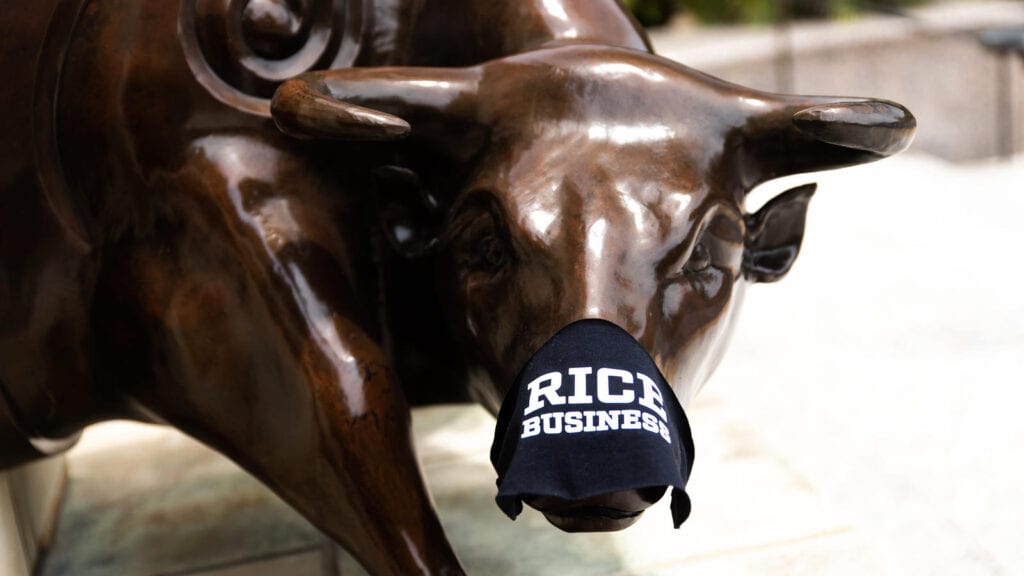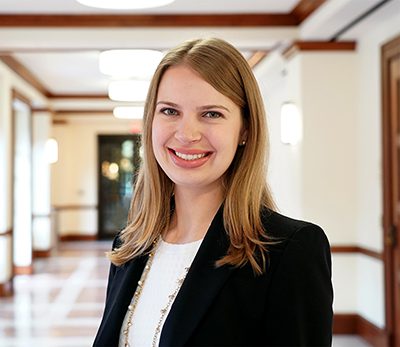How Rice Business Protects Its Learning Community During The Pandemic

Sponsored Content
At Rice Business, one of the first principles MBA students learn is to have a strategy. Whether it’s for a startup or an established organization, they’re taught that knowing their goals and preparing for adversity are key for performance. As the world confronts COVID-19, that lesson has proven apt for the school itself.
Located at a top research university near the world-class Texas Medical Center, Rice Business built on an existing, state-of-the-art safety infrastructure and its own culture of collaboration and leadership. In a recent conversation, Adam Herman, executive director for MBA student services, outlined the steps that make Rice Business both COVID-19 resistant – and as competitive as ever.
Thanks to the ability of faculty and staff to pivot to online course delivery, and to an early investment in technology, the school quickly reinvented its delivery of top-tier business training. “Our pandemic actions are an outgrowth of who we really are,” Herman said. “We’re an intentionally small business school located within a superb university community. As a part of Rice University, we used the university’s excellent protective protocols from the start, working closely with its university-wide Crisis Management Team.” As a result, Rice Business was able to quickly add adaptations for its own students. This has led to a learning community that has managed to keep COVID-19 cases relatively low while providing the same top education for which Rice Business is known.
At the university-wide level, protective measures now include:
- Regular testing of all community members through PCR-based mitigation testing
- An extensive contact tracing apparatus
- A COVID-19 dashboard
- Weekly community updates
Committed To Individual Responsibility
Both the university and Rice Business are committed to Rice’s university-wide standards of individual responsibility. “Among other policies, that means having our community members wear masks at all times on campus, except when eating, and to maintain six feet of distance,” Herman said. “We also utilized the university’s Culture of Care framework to remind students of our collective duty to each other, both with on-campus and off-campus behaviors.”
Within Rice Business the school’s signature collegiality promptly reinforced these policies, he added.
But collegiality, he noted, doesn’t imply as acting in lockstep. Because of the diversity in students’ lives and work responsibilities, Rice Business leadership prioritizes individual choice and judgement. No student, for example, is required to come to campus. Instead, Rice Business invested in new ways to deliver its programs and services to all.
Because student-led clubs, friendships and spontaneous chats all help build the unique, collaborative Rice Business culture, the school has been innovative in preserving them. “Student life programming, including student club and organization activities, continues,” Herman said. “We continue to deliver some activities like our now-online partio – the beloved weekly party on the patio. Case competitions take place online or in hybrid form: the October Adam Smith Society case competition, for instance, took place in hybrid mode, allowing both on-campus participants and remote team members to present to guest judges.”
Trainings on Agile and Six Sigma have been delivered online by the Consulting Association and the Operations and Supply Chain Association. Students even venture off-campus for outdoor outings hosted by the Golf Club – with six feet of distance, naturally.
When Feasible: Flexibility In Class Modes
Whenever feasible, Rice Business offers choices on how to attend class. Until recently, students and faculty had freedom to choose their classroom options, including fully-remote mode or modified modes for specific needs, health concerns and risk calculations.
“In the fall,” Herman said, “most students used what we call our two-room, dual-mode hybrid learning environment. It provided seats in on-campus classrooms for students in the majority of instances when they want to attend on campus.”
This January, as external COVID cases rose sharply, Rice turned to remote-only classroom attendance for community safety. As vaccination availability increases and COVID cases drop, Herman said, the school will pivot again to its multi-choice model.
At any time, students may take classes via fully-remote delivery from home or elsewhere, getting the same educational experience that they would in person. To ensure this quality, last summer Rice Business invested more than $1 million in technology, installing sophisticated microphone and video arrays allowing students to be easily seen and heard by their instructors and peers – wherever they are.
Top Ten Ranking In Classroom Experience
As a result, Rice Business teaching has continued to flourish: Last year, the Princeton Review gave Rice Business a #10 national ranking for classroom experience.
Maintaining student safety along with academic excellence has also shown the school’s interlocking strengths, Herman noted. “The student program office, all the folks who provide faculty and IT support, the professors, all ensured that students had the specific classes they needed to graduate on time.”
The real test of Rice Business, of course, is what happens after graduation. Here, too, the school has upgraded its already intensive career guidance. “Thanks to direction by Phil Heavilin, executive director of the Career Development Office, we offer all the same career services an MBA student would expect,” Herman said. “But we’ve also retooled our coaching and career education and infrastructure, so students are now prepared to do remote interviewing. In fact, many corporations are now recruiting remotely for the first time.”
No business student plans to have their graduate work upended by a pandemic. Even so, at Rice Business, teaching adaptability is business as usual. “Our students are already using the resilience, adaptability and critical thinking that come from not knowing what the future will look like,” he said. Because of the extraordinary measures taken to keep them safe, he said, “Rice Business is able to be a powerful lab – and a psychologically safe one – to experiment and then have this experience in your toolbox.”
Contact:

Name: Kalyn Speck
Title: Assistant Director of Recruiting, Recruiting and Admissions
Email: kms15@rice.edu
Phone: 713.348.3732
